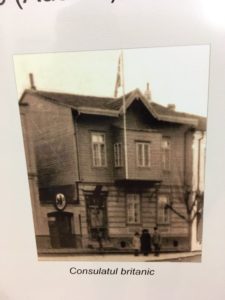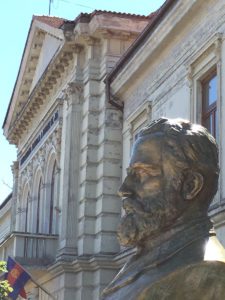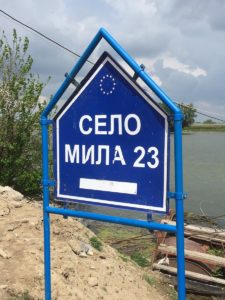30th May 2017
Britain and the Lower Danube
 As part of our #BritainInRomania activities, exploring the history of the rich British links with Romania, the Embassy held a series of events in Galati and Tulcea counties earlier this month. I joined the Director of the Galati History Museum for a seminar highlighting the work of the former British Consulate in that city, and talked with students at the University of the Lower Danube about the changing shape of British links with Romania from the nineteenth to the twenty-first centuries. In Tulcea, we partnered with the Museum of History and Archaeology for an exhibition on the British presence in the Lower Danube which formed part of the lively “museum night” events in the city.
As part of our #BritainInRomania activities, exploring the history of the rich British links with Romania, the Embassy held a series of events in Galati and Tulcea counties earlier this month. I joined the Director of the Galati History Museum for a seminar highlighting the work of the former British Consulate in that city, and talked with students at the University of the Lower Danube about the changing shape of British links with Romania from the nineteenth to the twenty-first centuries. In Tulcea, we partnered with the Museum of History and Archaeology for an exhibition on the British presence in the Lower Danube which formed part of the lively “museum night” events in the city.
Britain in the nineteenth century played an important role in the improvement of the navigability of the Lower Danube and the development of the ports of Wallachia and Moldavia, and later of the newly-independent state of Romania. Following the repeal of the Corn Laws in 1846, and the development of a stronger free-trading approach to agricultural products, there was a considerable British interest in the wheat and corn produced in the region, and exports of British equipment would contribute to the economic development of the new Romania.
In 1837, the son of a Scottish baker named Charles Cunningham arrived in Galati from the Turkish port of Smyrna, and was appointed British Vice-Consul. With an annual salary of £200, he was additionally entitled to engage in business, and continued as a trader as well as a diplomat. Cunningham was preoccupied with the improvement of the navigability of the Danube, which was essential if the British goal of the development of trade was to be met. Of the three main channels through the Danube Delta, the Sulina Channel was considered the most promising for the development of shipping, but the shallow bar at its mouth and its narrow, winding character were major obstacles.
 Sulina was however under the control of Russia, which in 1840 signed a ten-year agreement with Austria on the navigation of the Danube, undertaking to do the necessary work to improve the navigability of the Sulina Channel. While Russia did carry out some dredging, its heart was never really in the enterprise, not least as it did not consider the improvement of the navigability of the Danube to be in its best interests, as this would serve to bring Wallachian and Moldavian grain into direct competition with Russian grain on European markets. And indeed Russia also made extensive use of quarantine regulations to hinder trade along the Lower Danube. The Russo-Austrian agreement quietly expired in 1850.
Sulina was however under the control of Russia, which in 1840 signed a ten-year agreement with Austria on the navigation of the Danube, undertaking to do the necessary work to improve the navigability of the Sulina Channel. While Russia did carry out some dredging, its heart was never really in the enterprise, not least as it did not consider the improvement of the navigability of the Danube to be in its best interests, as this would serve to bring Wallachian and Moldavian grain into direct competition with Russian grain on European markets. And indeed Russia also made extensive use of quarantine regulations to hinder trade along the Lower Danube. The Russo-Austrian agreement quietly expired in 1850.
In a prescient report of that year, Cunningham suggested that, if Russia was unwilling to do the necessary work itself to improve the navigability of the Lower Danube, this could be carried out by means of a Commission of interested nations. Russia would not have agreed to such a plan, but its defeat in the Crimean War resulted in the imposition of a formula very like that recommended by Cunningham as part of the Peace of Paris, and in 1856 the European Commission of the Danube was born, with its headquarters in Galati, initially with just a two year mandate, though this was rapidly extended when it became clear that it could not hope to achieve its remit in so short a time period.
 The first British Commissioner, John Stokes, did much to develop the Commission and to put it on a more permanent footing. Stokes also brought to the Lower Danube, as chief engineer of the Commission, Charles Hartley, with whom he had collaborated in the Crimean War as members of the Corps of Engineers.
The first British Commissioner, John Stokes, did much to develop the Commission and to put it on a more permanent footing. Stokes also brought to the Lower Danube, as chief engineer of the Commission, Charles Hartley, with whom he had collaborated in the Crimean War as members of the Corps of Engineers.
Hartley worked for half a century on the Danube, straightening and deepening the Sulina Channel, which was crucial for the development of ports such as Tulcea, Galati and Braila. A bust of Sir Charles Hartley was erected in Sulina last year, standing prominently in front of the former administrative offices of the European Commission of the Danube, which still preserve a boardroom which appears to be unchanged from the days of the Commission, with dark wooden furniture carrying the “CED” monogramme.
British links with the Lower Danube were not confined to the work of engineers and administrators. British trading companies played an important role in the economic growth of the region, among them the Watson and Youell shipping house, based in Galati and with branches in Braila and Sulina. The company was engaged in the selling of Romanian grain on the European market, and in selling British products in Romania. I have written in an earlier blog about Sybille Youell, the beautiful Galati-born daughter of the co-owner of the company, who married Jean Chrissoveloni, a member of a wealthy ethnic Greek family of the area, and set up home in a manor house in the north of Galati county, where they entertained Prince Ferdinand and Princess Marie and later established a field hospital in the First World War tending to injured Romanian troops.
Nowhere gives a better feel for the richness of the British community in the Lower Danube, and of the challenges its members faced, than the international cemetery in Sulina, a town depicted as “Europolis” by the writer Jean Bart, for the diversity of its population, thanks to the European Commission of the Danube and later its status as a free port. There is the grave of William Simpson, the right-hand man of Charles Hartley, who died of malaria in 1870 at the age of 46. Other graves record deaths by drowning, and at the hand of cholera. Benjamin Creber, a “boy” on HMS Cockatrice, lies beneath a tombstone “erected by his shipmates”. And two identical gravestones describe a tragic nineteenth-century love story. It is that of a young officer named William Webster, who drowned in 1868 while trying to save his fiancée Margaret Ann Pringle, who is buried beside him.
 The influence of the British community in the Lower Danube was felt in often unexpected ways. The first football match on Romanian soil was apparently played by sailors from HMS Cockatrice. And even the names of settlements in the Danube Delta, like the village of Mila 23, show the legacy of the calculations of British engineers – expressed in miles, not kilometres. As we continue to build on the special partnership which exists between the United Kingdom and Romania, it is important to understand the deep historical roots on which this partnership rests.
The influence of the British community in the Lower Danube was felt in often unexpected ways. The first football match on Romanian soil was apparently played by sailors from HMS Cockatrice. And even the names of settlements in the Danube Delta, like the village of Mila 23, show the legacy of the calculations of British engineers – expressed in miles, not kilometres. As we continue to build on the special partnership which exists between the United Kingdom and Romania, it is important to understand the deep historical roots on which this partnership rests.
In response to Peter Fay. Sorry to disappoint the Cyrillic script is nothing to do with the EU. If you had read the article carefully and knew the area you would know that there is in Dobrega a large population of Russian speakers who have been there since the 18th century. You can also find the same further inland in villages such as Slava Rusa ( the clue is in the name )
Things work better when they are developed by a British character and tend to last longer, because, as the history showed it, best managers, best schools best researchers, best language – all came from Britain. Romania on the other side invented the car, the flight, the pen, petrol, reaction engine and the mother of Latin. I believe that working together, we can develop better products as history showed it.
A piece of history! Thank you fr sharing! Congratulations for being part of this!
Thank you for an interesting and informative blog.
There is one question that immediately comes to mind.
Why does the modern EU road sign use Cyrillic script to announce the village Mila 23, which is in a Latin script country?
Mmmmm.
Is this perhaps one of the EU crazy ideas that has upset many people in Britain?
….
Due to the Dracula films when I was young, I was not too happy about Transylvania.
However, an invitation from a lovely Bucurestian on the Net made me decide to take a holiday… and I have been hooked ever since!
Of course British companies to this day continue to provide the bulk of materials to maintain and improve the Sulina channel as well the navigable Danube.